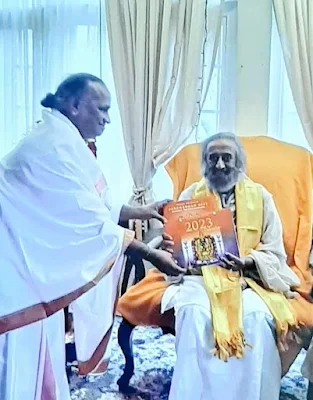Chapter 3 - The Four Approaches To Practical & Spiritual Life
Day 6
A wise man is said to have four things. Both inwardly and outwardly there are four techniques. They are called Sama, Dana, Bheda and Danda. To deal with people in the world, to be wise in the world, the first thing you use is Sama.
Sama means in a peaceful and understanding way. When that doesn't work out, then you go to the second method as the rescue. The second method is Dana. Dana means allowing it to happen, forgiving, creating a space.
When people don't recognise your generosity in allowing them space, then the third principle comes, Bheda. Bheda means to create a discrimination, make a difference, intentionally create a gap.
If somebody is at loggerheads with you, first you talk to them. All problems arise because of lack of communication. If you communicate properly, talk to them with love, evenness starts. When that doesn't work out, then, with the same love, you just ignore them.
If somebody makes a mistake, then ignore their mistake. Don't take notice. Allow them to realise it for themselves. Your generosity, your letting go, should make people realize their mistake. If they don't notice even then, then you start using difference, Bheda-create a difference.
If two people are there, then you be partial to one person, because, by doing that, the other person will realise the mistake he has made. In Dana, don't create any difference. It is a very big thing to note. In life you deal with Bheda many times.
You create difference. But it is not with awareness or intention. It is coming out of your unconsciousness. Consciously create a difference. This, a sensitive person will understand.
Now, even then, if they don't come to the way, then take a stick, Danda, the final approach.
If that person is insensitive even to the difference, what can you do with him? You have to take a stick. At last, with a stick, you make them realise. The same four methods apply to your inner life, your Being. However, in inner life, it is not one after another.
Sama, equanimity, maintain the equanimity. If pleasant sensations come, so what. Watch them. If unpleasant sensations come, so what. Watch them. Take it into equanimit. Meditation, voga, all that is pertaining to Sama-equanimity in the mind, inside.
But observing equanimity becomes difficult for many people. Dana means giving up that which disturbs you, that which cannot put you in the royal seat of equanimity. What is it that disturbs you? A guilt feeling of doing something wrong or an egoistic feeling of having done something great.
Both these feelings, this whole mind, with all it's merits and demerits-give it away, surrender, Dana. You have noticed in those moments when vou have surrendered, there is such a treedom. Dana is to surrender the very mind which is the cause of your sorrows, your problems, your misery.
Gurudev used to say, "The world needs your body and your possessions, I need only your mind. Give the world what it needs, give me what I need. Give me your mind." You go in the world and tell anybody, "I have a wonderful mind, will you keep it? Don't ask me anything, but I have a very beautiful mind."
Nobody bothers about your mind. Gurudev said, "I am asking you for that which nobody wants." It has the low est value in the market. The cheapest thing you can buy today is a human mind. And even when you spend some money on it to repair it, people don't want to take it.
You give your mind, you are also giving your psychiatrist fees on top of it. "Will you please take it?" People say, "No, you keep your garbage. Your mind is your problem. It bothers you. It says, "You did good things," Which pumps you up.
It says, "Oh, you did bad things," and it pushes you down. What have you done? A thought came and you were unaware and you acted. Another thought came, you were aware and you now thought, "Should I act or not act?" And that is a thought.
So it is all happening by your nature. If there was tension inside, the tension brought out negative actions. If you were relaxed and free inside, it brought out positive actions. It doesn't make any difference.
Negative actions give you suffering, but that suffering never stays all the time. It gives you some suffering and it vanishes. Positive actions give you some pleasure. After some time, that vanishes. Any action, and its fruit, vanishes.
It can never stay all the time. Whatever good actions you have done have their time limit, and then they vanish. It is like buying a ticket for the movie. You buy a ticket and go and sit in the movie. Whatever the movie is, a tragedy or a comedy, it is going to end.
However good or bad the movie is, it is going to end. The only thing is, when the movie is not good, you have the freedom to walk out of it.
You have purchased the ticket; you have entered the theatre. Now you are yelling and crying, "This movie is bad."I say, "Walk out" This is knowledge.
Whether you want to continue staying or not, you will come out of it anyway. It has just begun. Another two, three hours you will stay, and then you will walk out. You will come out and again you will buy a ticket for the same movie the next day.
This is forgetfulness. You forget from which theatre you came out, which movie you saw. You are in line again for the same movie, hoping you’ll see a better movie. This is what happens.






















Comments
Post a Comment